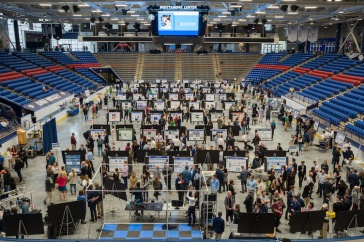
First there was walking the beach with her mother, crabbing with her father, and falling in love with the sea. Then carrying that love through high school, into her college career. From there, Mary Kate Munley ’21 spent a summer monitoring Loggerhead sea turtles nesting along the coast of Florida, and another studying the state’s stone crab population.
So, a pretty clear path to further schooling and then becoming a researcher at a marine laboratory or related agency, a path Munley is traveling with passion and commitment. In September a paper on Florida red tide that she helped author was published in the journal?Harmful Algae.
"In conducting and presenting my research, I have become passionate about the connection it has to fishermen, the environment and its potential to make a difference.”
In 2018, at the time Munley was interning with the Mote Marine Laboratory and Aquarium’s sea turtle conservation and research program, there was a severe outbreak of Karenia brevis, also known as the Florida red tide. The internship had her spending long hours on the beach monitoring sea turtle activities.
“We had to wear masks on the beach to keep us from coughing,” Munley says. “And because the red tide caused massive fish kills, we had to navigate our ATVs around piles of dead fish, crabs, eels, sea turtles, dolphins and more that covered the beach. It was experiencing this mass devastation that sparked my curiosity about the red tide blooms and its effects on the ecosystems.”
The following summer, Munley was awarded a National Science Foundation Research 188体育app_188体育在线-平台官网 for Undergraduates (NSF REU) to work in the fisheries ecology and enhancement program at Mote Marine Laboratory. It was then, conducting her own studies, that she discovered an interest in fisheries and her passion for research.
“Of the work I have done, my research on the Florida stone crab at Mote shaped my career,” the marine, estuarine and freshwater biology major says. “After experiencing the red tide blooms during my first summer at Mote it was incredible to then the next summer conduct research that provided more information about the effects of the red tide blooms.”
That experience led her to reach out to Elizabeth Fairchild, UNH research associate professor of biological sciences, and become involved in her lab. Munley still there works as an aquaculture technician assisting with research on the effectiveness of lumpfish as cleaner fish and maximizing lumpfish aquaculture. She also conducts research on channeled whelk and is taking an ocean research projects course looking at creating a better bait for the channeled whelk fishery.
Since COVID-19 hit, Munley has been doing her coursework online and research in the labs. A former secretary and president of UNH’s Sustainable Fisheries and Aquaculture club, she is now secretary of the recently revived UNH subunit of the American Fisheries Society.
Once she receives her bachelor’s degree, she plans to attend graduate school and has recently applied to UNH’s accelerated master’s in marine biology program to continue the work she has been doing with Fairchild on the channeled whelk fishery in Martha’s Vineyard
“My research interest is in fisheries ecology, specifically the impacts of anthropogenic stressors on commercial and recreational fisheries,” she says. “In conducting and presenting my research, I have become passionate about the connection it has to fishermen, the environment and its potential to make a difference.”
Of this year of COVID, Munley says, “Research rarely goes according to plan so I have learned to be flexible. I think that adaptability has been extremely useful throughout the adjustment.”
-
Written By:
Jody Record ’95 | Communications and Public Affairs | jody.record@unh.edu




















































